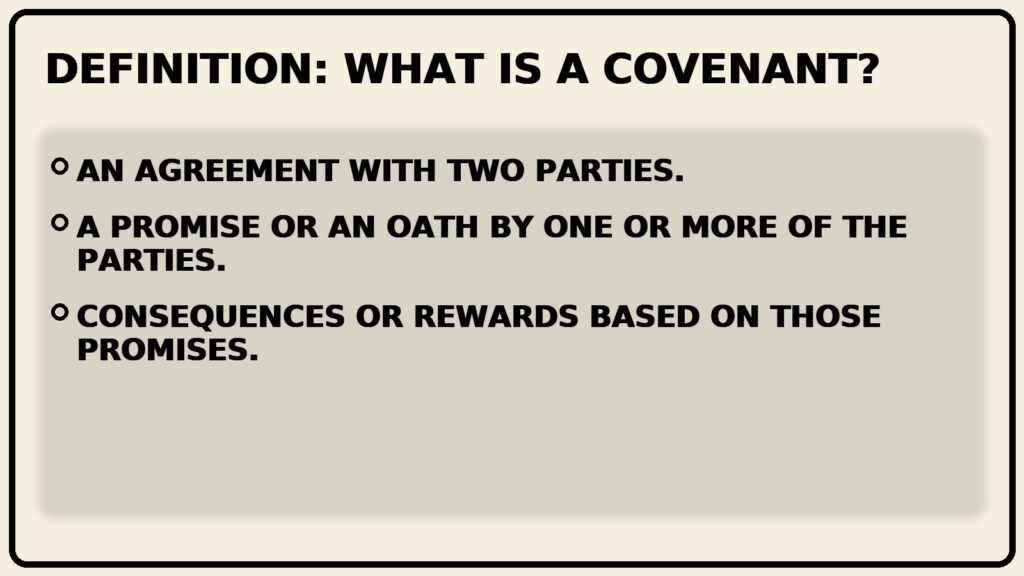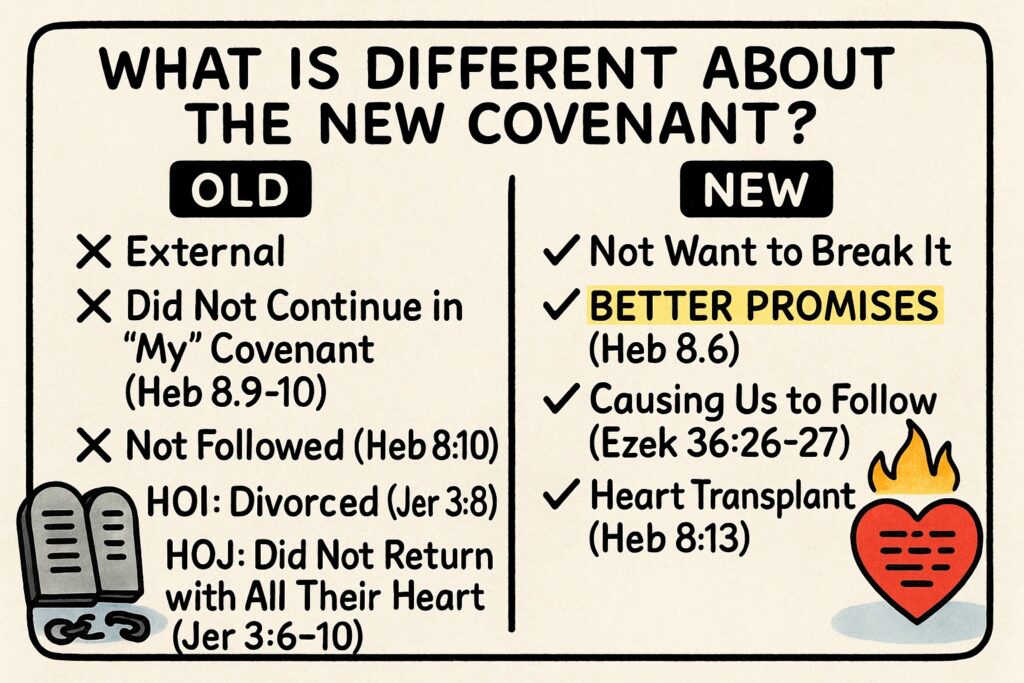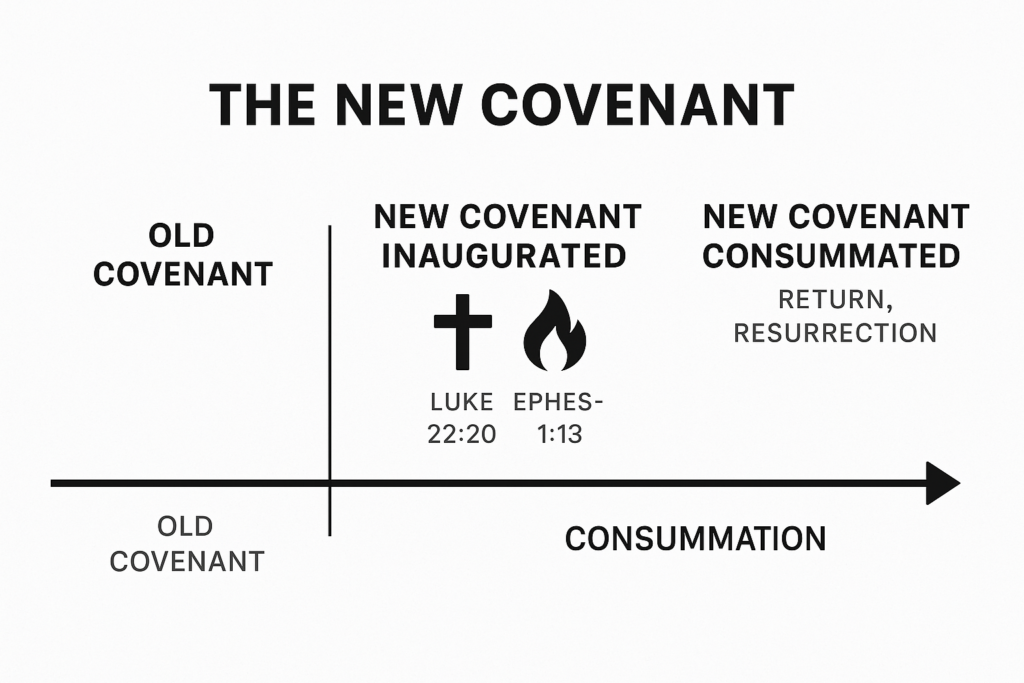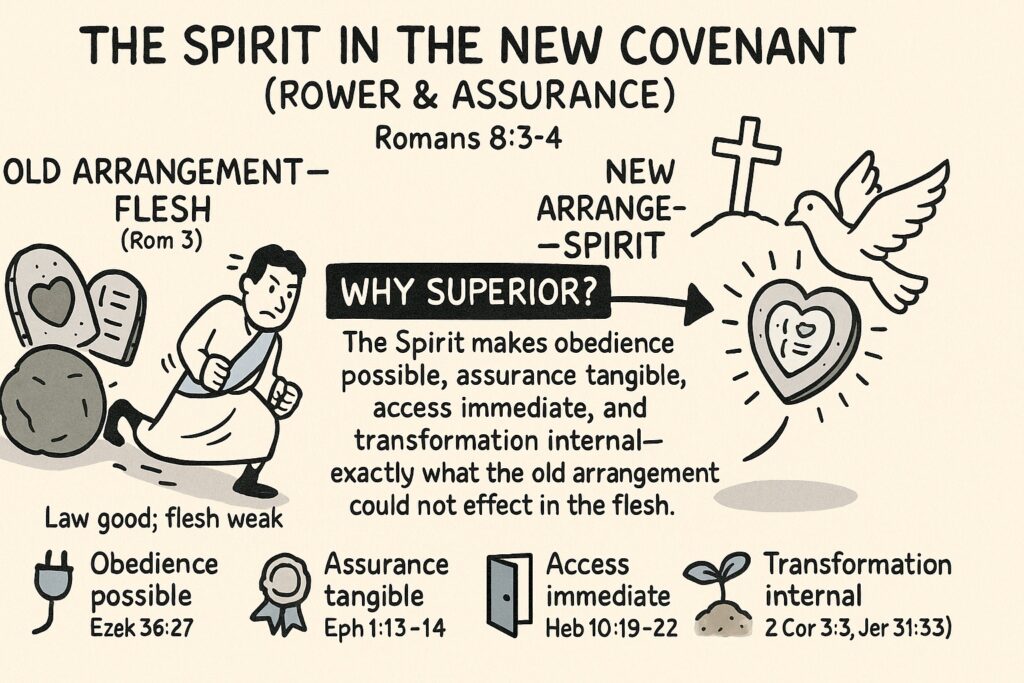Are We in the New Covenant? — Already and Not Yet
- Definition: What is a Covenant?
- Why Need a New Covenant? (Jeremiah 3:8; Dispersion & Return)
- New Covenant Prophesied (Jeremiah 31:31–34)
- Better Promises — Not a Better Law (Hebrews 8:6; 8:8)
- The Spirit in the New Covenant (Romans 8:3–4, etc.)
- What Is ‘New’ About the New Covenant?
- New Covenant with “New” Blood
- New Covenant: Apostles Writing
- New Covenant Here? The “Already / Not Yet” Pattern
- Jesus on “Knowing the Lord”
- God’s Answer — Ephesians 1:13–14
- Visual Timeline
- Conclusion
What is a Covenant?
- An agreement with two parties.
- A promise or an oath by one or more of the parties.
- Consequences or rewards based on those promises.
Plain-language definition: A covenant is a solemn, binding agreement between parties, confirmed by promises/oaths and carrying blessings or consequences based on faithfulness to those promises.
Why Need a New Covenant? God Divorced the House of Israel for Continual Covenant-Breaking
Divorce = “They were lost; God was no longer their husband in covenant. They were not ‘saved’ any longer, nor associated with God or His people.”
- 10 of the 12 tribes (House of Israel, “HOI”) were cast into Assyria and to the rest of the world — the Dispersion.
- 2 of the 12 tribes (House of Judah, “HOJ”) were not divorced but exiled to Babylon for 70 years as discipline.
“She saw that for all the adulteries of that faithless one, Israel, I had sent her away with a decree of divorce…”
— Jeremiah 3:8
The House of Israel (the ten northern tribes) was divorced and dispersed; the New Covenant is God’s promise to renew covenant with the House of Israel (cf. Matthew 15:24) and the House of Judah by writing His Torah on their hearts (Jer 31:33).
New Covenant Prophesied: (Jeremiah 31:31–34)
“Behold, the days are coming, declares the Lord, when I will make a new covenant with the house of Israel and the house of Judah, not like the covenant that I made with their fathers on the day when I took them by the hand to bring them out of the land of Egypt, my covenant that they broke, though I was their husband, declares the Lord. For this is the covenant that I will make with the house of Israel after those days, declares the Lord: I will put my law (Torah) within them, and I will write it on their hearts. And I will be their God, and they shall be my people. And no longer shall each one teach his neighbor and each his brother, saying, ‘Know the Lord,’ for they shall all know me, from the least of them to the greatest, declares the Lord. For I will forgive their iniquity, and I will remember their sin no more.”
— Jeremiah 31:31–34
Key observations: Israel broke the covenant; the Lord was their husband; the New Covenant promises the same divine Torah written on hearts, full forgiveness, and (in the future) universal knowledge of God—so that “know the Lord” no longer needs to be taught.
Better Promises — Not a Better Law
“But as it is, Christ has obtained a ministry that is as much more excellent than the old as the covenant he mediates is better, since it is enacted on better promises.”
— Hebrews 8:6
“For he finds fault with them when he says, ‘Behold, the days are coming, declares the Lord, when I will establish a new covenant with the house of Israel and with the house of Judah…’”
— Hebrews 8:8
The text places the fault on them (the people), not on God’s law. The New Covenant does not introduce a new law; it applies the same Torah internally—on the heart—while adding better promises (Spirit-empowered obedience, intimate knowledge of God, full forgiveness).
What are the “better promises,” and why are they better?
- Law written on hearts (Jer 31:33; 2 Cor 3:3) — internal transformation replaces mere external inscription, addressing the people’s hardness (Heb 8:8).
- Indwelling Spirit who empowers obedience (Ezek 36:26–27; Rom 8:4) — not just commands, but power to “walk in my statutes.”
- Full, once-for-all forgiveness secured by Messiah’s sacrifice (Jer 31:34; cf. Heb 9:12; 10:14) — superior to repetitive sacrifices.
- Direct access to God (Heb 10:19–22) — a new and living way into God’s presence.
- The Spirit as a seal and down payment (arrabōn) of our inheritance (Eph 1:13–14) — God guarantees completion.
- Universal knowledge of the Lord (future consummation) (Jer 31:34) — the covenant culminates when “all shall know Me.”
- One new humanity (Eph 2:14–16) — hostility removed, Jew and Gentile reconciled in Messiah.
Why better? These promises solve the human problem (stony hearts and ongoing guilt), provide power for obedience, grant assured access and inheritance, and aim at a final state where God’s people universally know Him.
The Spirit in the New Covenant (Power & Assurance)
“For God has done what the law, weakened by the flesh, could not do. By sending his own Son in the likeness of sinful flesh and for sin, he condemned sin in the flesh, in order that the righteous requirement of the law might be fulfilled in us, who walk not according to the flesh but according to the Spirit.”
— Romans 8:3–4
- Problem addressed: The law is holy, but our flesh is weak. The New Covenant provides the Spirit to fulfill the law’s righteous requirement in us.
- Spirit writes, not ink: “Written… with the Spirit of the living God… on tablets of human hearts” (2 Corinthians 3:3).
- New heart & Spirit: “I will put my Spirit within you, and cause you to walk in my statutes” (Ezekiel 36:26–27).
- Seal & down payment: “Sealed with the promised Holy Spirit… the guarantee of our inheritance” (Ephesians 1:13–14).
- Teacher & guide: “He will teach you all things… guide you into all the truth” (John 14:26; 16:13).
- New life & adoption: “The Spirit… bears witness… we are children of God” (Romans 8:15–16).
Why superior? The Spirit makes obedience possible, assurance tangible, access immediate, and transformation internal—exactly what the old arrangement could not effect in the flesh.
What Is New About the New Covenant?
- Israel broke the covenant. (cf. Jeremiah 31:32)
- God was their husband, but is no more.
“She saw that for all the adulteries of that faithless one, Israel, I had sent her away with a decree of divorce…”
— Jeremiah 3:8
- God renews the covenant with the House of Israel and the House of Judah by putting His Torah (law) within them once again.
- We will know God. The covenant ensures intimate knowledge of Him.
- We will no longer have to teach each other the Word — this remains a future fulfillment.
The Hebrew word for “law” in Jeremiah 31:33 is Torah (תּוֹרָה) — God’s instruction/teaching. The promise is not a different law, but the same Torah internalized by the Spirit: “I will put my law (Torah) within them, and I will write it on their hearts.”
“And I will give them one heart, and a new spirit I will put within them… that they may walk in my statutes and keep my rules and obey them…”
— Ezekiel 11:19–20
“I will put my Spirit within you, and cause you to walk in my statutes and be careful to obey my rules.”
— Ezekiel 36:26–27
“…when we love God and obey his commandments… his commandments are not burdensome.”
— 1 John 5:1–3
Summary: The New Covenant is “new” because God writes His Torah on hearts by His Spirit—renewing relationship, restoring obedience, and promising a future when all will know Him.
New Covenant with “new” blood
Yeshua inaugurated the New Covenant by His blood.
“This cup… is the new covenant in my blood.”
— Luke 22:20
“For this is my blood of the covenant, which is poured out for many for the forgiveness of sins… until that day when I drink it new with you in my Father’s kingdom.”
— Matthew 26:28–29
New Covenant: Apostles Writings
The apostles testify that Messiah mediates a better covenant with better promises and that the Spirit writes on human hearts.
“Christ has obtained a ministry… the covenant he mediates is better… I will put my laws into their minds, and write them on their hearts…”
— Hebrews 8:6, 10
“You show that you are a letter from Christ… written not with ink but with the Spirit of the living God, not on tablets of stone but on tablets of human hearts… ministers of a new covenant… of the Spirit.”
— 2 Corinthians 3:3, 6
“You have been anointed by the Holy One, and you all have knowledge… his anointing teaches you about everything…”
— 1 John 2:20, 27
The “Already / Not Yet” Pattern
Biblically, covenants unfold in stages: initiation → continuation → consummation. We are already beneficiaries of Messiah’s sacrifice and the Spirit, yet we await the day when “all shall know the Lord” without needing teachers. 
Jesus: on “Knowing the Lord”
“But the Helper, the Holy Spirit… will teach you all things and bring to your remembrance all that I have said to you.”
— John 14:26
“When the Spirit of truth comes, he will guide you into all the truth…”
— John 16:13
“And this is eternal life, that they know you, the only true God, and Jesus Christ whom you have sent.”
— John 17:3
“Go therefore and make disciples of all nations… teaching them to observe all that I have commanded you.”
— Matthew 28:19–20
This shows we are in the process stage—Spirit-empowered learning continues until consummation.
God’s Answer — Ephesians 1:13–14 (“Until We Acquire Possession of It”)
“In him you also… believed in him, were sealed with the promised Holy Spirit, who is the guarantee of our inheritance until we acquire possession of it, to the praise of his glory.”
— Ephesians 1:13–14
The Spirit is God’s seal and arrabōn (down payment). We truly belong to Him now (“already”), while we await the full inheritance (“not yet”): resurrection life, complete restoration, and universal knowledge of God.
“We ourselves… groan inwardly as we wait eagerly for adoption as sons, the redemption of our bodies.”
— Romans 8:23
“An inheritance that is imperishable… kept in heaven for you… for a salvation ready to be revealed in the last time.”
— 1 Peter 1:4–5
Visual Timeline (Includes Millennial Reign)
How to read: Left → right shows redemptive history moving from Old Covenant to the New Covenant’s inauguration, its present continuation (already/not yet), the Millennial Reign, and final consummation when “all shall know the LORD.”
Old Covenant Torah on stone; sacrifices Israel pledges → breaks
Messiah’s Blood Inauguration
Pentecost Spirit given
New Covenant (Already / Not Yet) Law on hearts; forgiveness; Spirit seal Discipleship continues; gospel to nations
Millennial Reign (Rev 20:1–6) Law goes forth from Zion (Isa 2:2–4)
Consummation All know the LORD
External administration Internal transformation + mission New creation (Rev 21–22)
- Old Covenant: Torah written on stone; Israel pledged obedience but broke covenant.
- New Covenant Inaugurated: Yeshua’s blood; Spirit given; Torah written on hearts (Luke 22:20; Acts 2; Jer 31:33).
- Already / Not Yet: Forgiveness and the Spirit are present realities, while universal knowledge of God remains future.
- Millennial Reign: Messiah reigns; nations taught (Rev 20:1–6; Isa 2:2–4).
- Consummation: Resurrection, full inheritance, and “all shall know the LORD” (Jer 31:34; 1 Pet 1:4–5).
Conclusion
Yes — we are in the New Covenant now: inaugurated by Yeshua’s blood and sealed by the Spirit. Not yet — we await its fullness: resurrection, universal knowledge of God, and complete restoration of His people. The New Covenant is both present reality and future hope.


